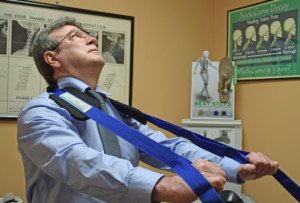
When it comes to trapezius pain, few people actually consider cancer and automatically assume it’s just a strained muscle from working too hard or a sore muscle from a gym routine.
But cancer can actually lead to pain in the trapezius muscle.
And it isn’t just one type of cancer that can do this.
Soft-Cell Sarcoma
A soft-cell sarcoma type of cancer can cause pain in the trapezius.
Most of these malignant masses develop in the upper body and can affect the shoulder area.
The definition of a soft-cell or soft-tissue sarcoma is a cancer that develops in connective or soft tissue.
These rare tumors involve less than one percent of all new cancer diagnoses every year in the U.S. Most patients are over 50.
Along with pain in the trapezius muscle, the cancerous mass may also be felt as a lump or area of swelling, and can cause mobility problems.
Putting the Rarity of Soft-Cell Sarcoma in Perspective
“I don’t ever recall seeing a soft-cell sarcoma affecting the shoulder area,” says Dr. David Beatty, MD, a retired general practitioner with 30+ years of experience and an instructor of general medicine for 20+ years.
“I used to audit our practice mortality figures between about 1990 and 2010.
“The practice had 16,000 patients and six to eight doctors.
“Each year about 160-200 people lost their lives. We lost someone with soft-cell sarcoma roughly every other year.
“Given that some sarcoma patients would have survived, I would estimate that the incidence was approximately one person per year for our practice.
“I would only have managed about one in seven of these patients, so I personally would have seen a new case about every seven years.”
Bone Cancer Spread
Osteosarcoma (bone cancer) can metastasize to the trapezius muscle and cause pain.
A report in World Journal of Surgical Oncology tells of a 51-year-old who was diagnosed with bone cancer in the leg.
He underwent chemotherapy and then developed pulmonary metastasis.
A year later a lump was found in his shoulder – the trapezius muscle. The report calls this incident “extremely rare.”
What Trapezius Muscle Pain Is Most Likely to Be
Pain, discomfort or soreness in the traps by far is most likely to be of musculoskeletal origin – caused by some kind of positional or loading strain.
• Hunched over a desk for prolonged periods
• Odd body positioning (e.g., cradling phone between ear and shoulder)
• Non-ergonomic settings such as a keyboard that’s too high or a chair with short armrests
• Sleep position
• Sport or weightlifting
• Repetitive stress injury from work
• Purse or sack slung over one shoulder
• Bra straps
Additional Causes of Trap Pain
• Whiplash
• Uneven leg length
• Tensing up the shoulders
• Heavy coat
“Distorted forward head position with a loss of the normal cervical curve can result in the over-firing of the upper traps, as well as other muscles,” says Dr. Tom Carpenter, corrective exercise specialist, certified personal trainer and chiropractor, inventor of Stand Corrected™, a portable harness-like stretching tool that helps alleviate back, neck and shoulder pain.
Dr. Carpenter further explains, “Poor breathing techniques while exercising can cause these muscles, which are considered accessory muscles for breathing, to be overworked to the point of strain and spasm.
“Also, many people seem to hold their tension from stress in this area.
“Correction of vertebral spinal alignment, myofascial release techniques, trapezius stretching and strengthening, and attention to posture correction can all help to relieve this discomfort in many cases.”

Stand Corrected™
Though the answer is “Yes” to “Can cancer cause pain in the trapezius muscle,” it is extremely unlikely that this is the cause of your pain.
Nevertheless, if you’re worried or the discomfort doesn’t resolve (and especially if it’s accompanied by mobility problems), do not hesitate to see a doctor.
 Dr. Beatty has worked in primary medicine, surgery, accident and emergency, OBGYN, pediatrics and chronic disease management. He is the Doctor of Medicine for Strong Home Gym.
Dr. Beatty has worked in primary medicine, surgery, accident and emergency, OBGYN, pediatrics and chronic disease management. He is the Doctor of Medicine for Strong Home Gym.

Photo credit: Aleesia Forni









































